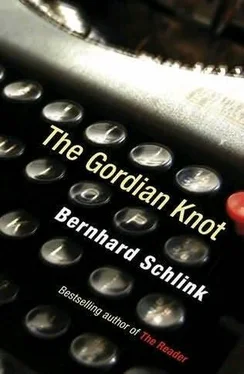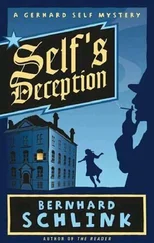Finally she told him. He gradually understood that what she was telling him was really their story, with the two of them, the real Françoise and the real Georg, that it was part of their lives like his house and his car, his office in Marseille, his jobs and projects, his love for Françoise, his getting up in the morning, his going to bed at night.
She assumed they had already targeted him when they sent Bulnakov and her to Pertuis. Who were “they”?
“The Polish secret service, and behind them the KGB-don’t ask me, I don’t know. They arrested my brother and father, right when martial law was declared. I’ve been working for them ever since. They released my father, but they told me they’d come get him again if I didn’t continue… As for my brother…” She sobbed, covering her face with her hands. “They told me his life depends on me. His death warrant has been signed, and whether he will be pardoned depends on… He had called for open resistance and thrown a Molotov cocktail when the militia cleared the square in front of the university-as far as I know the only Molotov cocktail thrown in all of Poland at that time-and the driver and the passenger were burned in the car. He has… he is… I love my brother very much, Georges. Ever since Mother died, he was the most important person in my life, until…” She sobbed. “Until I met you.”
“And you’re ready to have me thrown in jail in order to get your brother out?”
“But everything’s going so well. You’re happy, and so am I. What do we care about these helicopters? Soon my people will have what they want, my brother will get his pardon, and they’ll leave us alone, and then… You asked me if I will live with you. I want to so much, I can’t live without you anymore, I want to be with you always, it’s only that… Don’t you see why I couldn’t just say yes back then? Please, please…”
Again the voice and look of a little girl, frightened because she’d done something bad, hopeful because she’d made up for it all, and sulking, because he hadn’t rewarded her for it yet.
“Why would they leave you alone once they have the documents they want?”
“They promised. They said they’d release my father, and they kept their promise.”
“You’d never have worked for them if they hadn’t let him go. They’ll commute your brother’s death sentence to life in prison, at which point you’ll go on working for them so they will reduce his sentence to fifteen years, and they can keep on haggling further reductions. You won’t have a choice.”
She didn’t say anything, but continued to look at him, sulking. “It goes without saying that they have to offer you something so you will keep up the work,” he continued. “Let’s say three years off his sentence for every year that you work for them. That means they have you where they want you for at least another five years. You’re good at what you do, you’re fluent in French, know the country and the people. Believe me, they’ll keep you where they want you. How long were you already in France when they recruited or forced you into this?”
“It sounds like you’re cross-examining me! I don’t like talking with you like this.”
He had moved to the edge of the bed, his back straight, his hands cradling his stomach. He was staring intently. “It’s not only you they have-they’ve got me too. And when they’re done with the attack helicopter, they’ll set their sights on the stealth reconnaissance plane, or the new control system or bomb, or God knows what! Once I’ve worked for them for a long time, they’ve got me where they want me, even without you. Is this what you wanted? Is this how you want us to live?”
“Our life isn’t all that bad. We’ve got each other, a nice house, enough money. And nobody need know that you’re aware of what’s going on. Why can’t things just go on the way they are? Weren’t you happy all this time?”
He said nothing. He looked out the window into the night and felt heavy with fatigue. What she was saying was true, but then again, it also wasn’t. What did he care about helicopters, fighter jets, reconnaissance planes, bombers, and all the maneuverings surrounding the arms race, armament, and disarmament? Since he didn’t have the time or money to write a novel, he didn’t care what he was translating or for whom: IBM, Mermoz-why not for the Poles and Russians too? It wouldn’t involve any more work; he laughed bitterly. But his freedom was done for. He felt this with painful clarity. He was no longer sitting on the podium maneuvering all the trains, but was a train himself that others could set in motion, bring to a halt, start up again, accelerate, and stop.
“Georg?”
He shrugged his shoulders despondently. Had his early freedom been just an illusion? He remembered her sudden departures on Sundays.
“Why did you always have to deliver the negatives of the plans on Sunday?” he asked her.
“What?”
He didn’t repeat the question. Something didn’t fit. Just didn’t fit. Something kept buzzing in his mind, not a clear thought, but perhaps just the disbelief that all this should have happened to him, and that the way he was living would go on, but look very different from this point.
She sighed and laid her head in his lap. Her left hand caressed his back, and her right hand slid beneath his bathrobe, reaching gently between his legs. Surprised, and as if from a distance, he felt his arousal.
“Are you… were you Bulnakov’s lover?”
She let go and sat up. “What kind of a question is that? How mean and spiteful! I haven’t been with anyone else since I met you, and as for what happened in the past, it doesn’t concern either of us. Not to mention that if Bulnakov had wanted to sleep with me, I would hardly have had a choice.”
“What about now?”
“I have no choice now either, if you want to know!” she shouted. “I let him do his thing, then he gets up, buttons his pants, and tucks in his shirt. Shall I show you? Go on, lie down, you be me and I’ll be him, go on!” She tried to pull Georg onto the bed, tugged at him, her hands striking out. Then she began to sob, and she curled up like a fetus.
Georg sat there, his hand on her shoulder. Finally he lay down next to her. They made love. Outside, the sun was rising and the first birds were beginning to sing.
SHE GOT UP AT DAYLIGHT. He stayed in bed, listening to her movements in the next room, the flushing toilet, the clattering dishes in the kitchen, the sound of the shower. She opened the living-room shutters, which banged loudly against the outside wall, and he waited for her car to start. But she must have sat down in the rocking chair with a cup of coffee. It was a while before the hinges of the outer gate creaked and the engine of her Deux Cheveaux started up with a stutter and the gravel rasped under the tires. Wrapped in the scent of their body and their love, exhausted by the nocturnal battle, he listened to the car drive away.
He woke up again hours later. The sun was shining into the room. He didn’t have the strength to get up; he barely wanted to move into a more comfortable position. Then he did get up, without knowing why, or why exactly at that moment. He got up. He showered, dressed, made coffee, drank it, fed the cats. He did this all with a strange lightness. He looked for money in the drawer and found it, put on his jacket, took the keys, locked the door, got into his car, and drove off. His movements were controlled. He monitored the road before him closely, the potholes, the cars turning out from side roads, the cars coming toward him. He drove fast, carefully, detached. He felt as if he wasn’t driving, as if he could plow into a tractor or a tree without getting hurt, without so much as denting his car. He parked under the plane trees by the pond and went into the pharmacy. Here too he felt as if he were watching himself from a distance. As he walked, his movements were light. It was as if only the shell of his body were walking, as if he were empty inside and the shell was porous, letting in light and air.
Читать дальше












